5 Ways USAID’s ACCESS Program is Helping End Malaria in Madagascar
5 Ways USAID’s ACCESS Program is Helping End Malaria in Madagascar
![[A mother and her child sit under their bednet in Vohipeno, Madagascar.] {Photo credit: Samy Rakotoniaina/MSH}](https://msh.org/wp-content/uploads/2020/05/5ways_5_715px.png)
While progress against malaria in the last 20 years has been significant, many people continue to suffer and die from this preventable and treatable disease. Malaria is among the leading causes of child mortality in Africa. In 2018, nearly 900,000 children in 38 African countries were born with a low birth weight due to malaria in pregnancy, and children under five still accounted for two-thirds of all malaria deaths worldwide. As COVID-19 tests the resilience of health systems worldwide, health leaders warn that disruption of malaria services and prevention activities could further derail hard-won gains. The challenges and consequences of malaria are complex and far-reaching for individuals, communities, and health organizations, requiring multiple paths to successful prevention and treatment.
In Madagascar, where malaria is a leading cause of child mortality, USAID’s Accessible Continuum of Care and Essential Services Sustained (ACCESS) Activity, led by MSH, works across all levels of the health system to strengthen malaria detection, prevention, diagnostic, and treatment capacities. Thanks to the U.S. President’s Malaria Initiative’s (PMI) major contribution through USAID, ACCESS supports the National Malaria Control Program in improving the quality, availability, and uptake of malaria treatment and prevention services provided in health facilities and by community health workers. This includes building capacity in supportive supervision and management, use of health data, and improved communication and messaging within communities. Through engaging with communities, health actors, the Ministry of Public Health (MoPH) and other ministries, and international and local partners, ACCESS supports an integrated and systems thinking approach to reducing child morbidity and mortality due to malaria.
A few of these main activities include:
1. Strengthening the Leadership, Governance and Management of the Ministry of Public Health
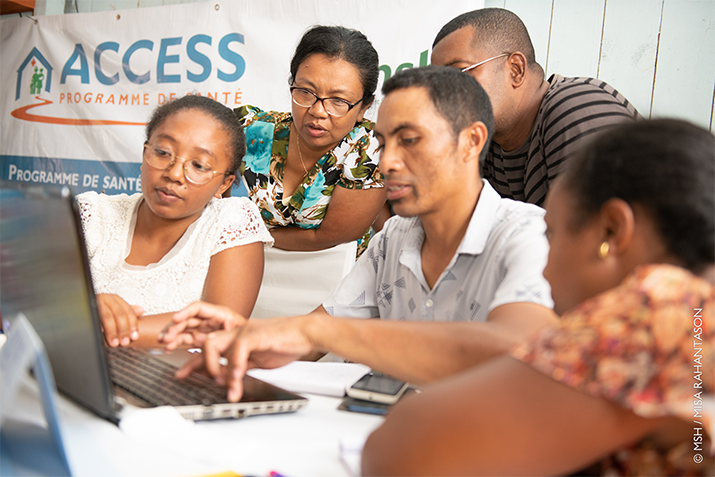
ACCESS builds the capacity of the National Malaria Control Program (NMCP) to manage the country’s malaria activities. Through innovative and proven approaches, ACCESS is supporting the MoPH in its ability to use health data to drive decision making that is responsive to the diverse needs of each district and community. This groundwork will help Madagascar establish and maintain surveillance systems that can detect and respond to localized outbreaks. Thanks to a collaboration with USAID’s IMPACT program — strengthening supply chain systems for maternal and child health, malaria, and family planning activities — there is also a better management of the complex public-sector supply chain, which ensures that malaria commodities are reliable and equitably distributed.
2. Ensuring the provision of high-quality malaria services
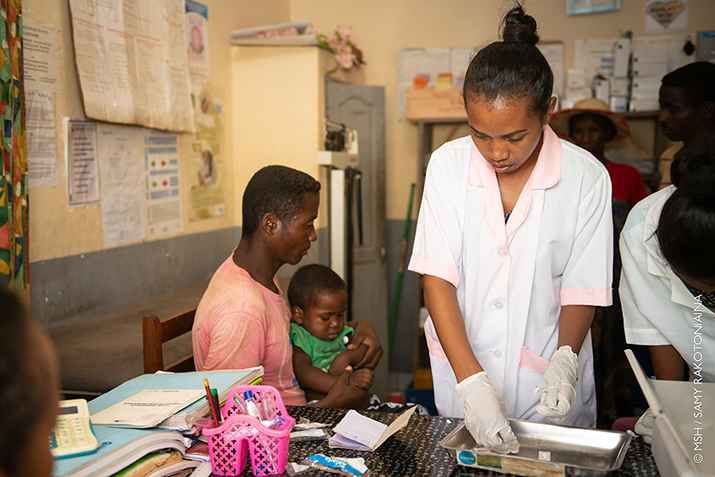
In ACCESS regions, nearly 90% of children who present with a fever are tested for malaria, and 90% of positive cases receive proper treatment. To achieve such results, ACCESS works alongside the MoPH to train community health volunteers (CHVs) and health workers across the continuum of care to deliver high-quality malaria services. At the community level, CHVs are trained to diagnose and treat uncomplicated cases of malaria in children under five, as well as to refer severe cases to a health center or referral hospital. At the health facility level, health workers diagnose and treat both uncomplicated and severe or complicated cases of malaria. ACCESS facilitates sustainable impacts with on-site coaching and supportive supervision. New approaches are implemented in target regions to improve malaria case management, such as the introduction of rectal artesunate for managing the most severe cases, or home-based care to ensure every household is reached.
3. Focusing on malaria in pregnancy
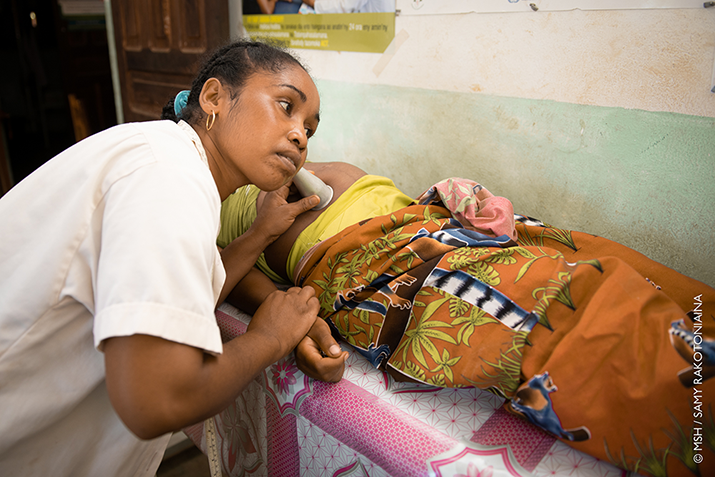
Maternal malaria can lead to life-threatening complications for both mothers and their infants. ACCESS supports holistic care that integrates malaria prevention with antenatal care. CHVs and community actors are empowered with tools and skills to identify pregnant women and to refer them to health centers for antenatal care. Health workers are also trained to provide high-quality antenatal care services that include malaria prophylaxis treatment and insecticide-treated nets.
4. Facilitating community-based malaria surveillance
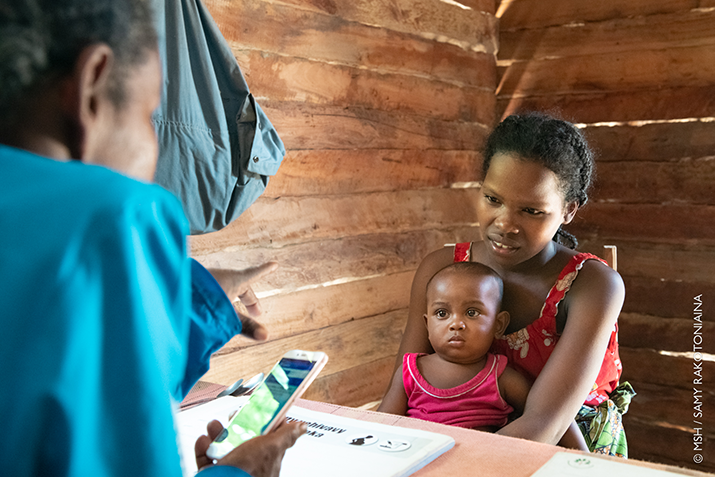
ACCESS is scaling up the use of a mobile-based application, equipping CHVs and health workers with smartphones and tablets and training them on the use of the mobile health system. CHVs use the application to report routine surveillance data and to automatically generate alert messages for any sudden spikes in the number of malaria cases. ACCESS also supports the use of the national District Health Information Software II (DHIS2) system, a health management information system platform, at the health center level to report on 28 epidemic-prone diseases, including malaria.
This surveillance system is critical in enabling the government to rapidly respond to outbreaks and minimize their impact. When a surge in malaria cases, or shortages of malaria commodities, is observed through this data, priority areas can be rapidly identified, targeted social behavior change campaigns can be implemented, and the data can be used to more accurately forecast supply needs and ensure reliable access to stock.
5. Fostering social behavior change
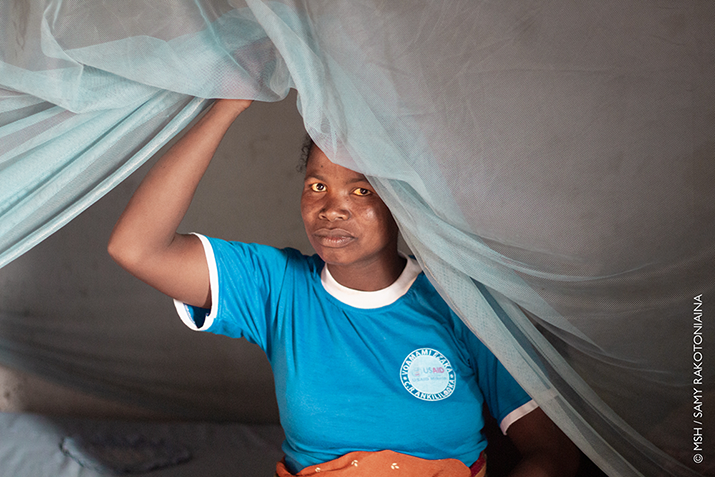
ACCESS developed an integrated social behavior change campaign, alongside the MoPH, that promotes the use of insecticide-treated nets and intermittent preventive treatment for pregnant women. Care-seeking behavior, including what symptoms to look out for and when to visit a CHV or health center, are also prominent components of the program’s activities. ACCESS disseminates these messages through radio and TV spots, posters, and occasional nationwide campaigns. ACCESS also trains CHVs and other community-level health actors in promoting malaria prevention activities through informal community dialogues.
The Accessible Continuum of Care and Essential Services Sustained (ACCESS) program is a five-year integrated health project funded by the United States Agency for International Development (USAID) and led by Management Sciences for Health. Through the ACCESS program, the US Government continues its support to the Government of Madagascar in accelerating sustainable health impacts for nearly 16 million Malagasy people — as measured by sustained reductions in maternal and child mortality and morbidity — and strengthening the Ministry of Public Health’s stewardship of the health sector.